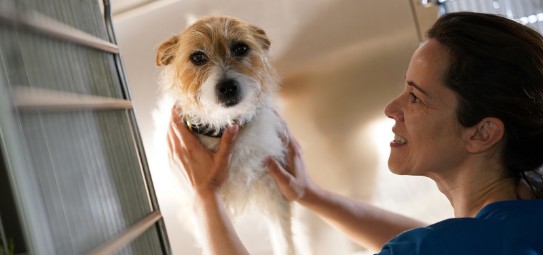
Teddington Vet Nurses Highlight Winter Care for Senior Rabbits
November 12, 2024
Rabbits are elite hiders of pain thanks to their built-in ‘predator protection’ system. In the wild, showing pain and weakness would make them vulnerable to predators so it’s no surprise they’d want to keep their pain under wraps. Alpha Vets’ nursing team recommend getting your older rabbit’s health checked regularly to uncover any problems that could be underlying.
It’s important to make sure your senior rabbit stays warm over the colder months to keep them happy and healthy. Besides exacerbating senior ailments, getting too cold can be dangerous for rabbits. This may involve bringing them indoors, providing pet-safe heat pads or ensuring accommodation is well insulated.
Book a senior rabbit health check
Understanding the needs of senior rabbits
What age is a rabbit considered ‘old’ or a senior?
Small rabbit breeds generally become seniors at age 8, medium breeds at 6, and large breeds are considered seniors at just 4 years of age.
Our veterinary nursing team in Teddington have put together their advice for what can hinder your rabbit’s senior years and how you can help them:
Weight & Diet: Older rabbits may be less active and either gain (if eating the same amount) or lose (tyipcally if they have a health problem) weight. Although hay should still form the vast majority of your senior rabbit’s diet, alongside some greens, an egg cup full of pellets formulated for senior rabbits can help support older bunnies. Weigh your senior rabbit regularly and contact our team at Alpha Vets if you notice any unexpected changes, or if you’d like tailored nutrition advice.
Dental Care: Many older rabbits develop dental disease, and malocclusion (misalignment of the teeth and the way the upper and lower teeth fit together when the mouth is closed) can happen at any time, potentially becoming an emergency if your rabbit struggles to eat. Watch for signs like reduced appetite and droppings, favouring certain foods, drooling, weight loss, or swellings around the mouth and jaw. In an emergency, contact our vets in Teddington on 0208 943 2303.
Arthritis & Spondylosis: These common conditions in senior rabbits often go undiagnosed without regular health checks. Slowing down isn’t just a sign of age – it could be due to these painful ailments.
- Arthritis in Rabbits: Primarily affects the joints, causing stiffness, difficulty hopping, reduced mobility, and reluctance to groom or move around.
- Spondylosis: A degenerative spinal condition in rabbits; may also lead to stiffness and reduced mobility, but can be more focused on back pain, difficulty posturing (like stretching), and sensitivity around the spine.
After diagnosis, treatment can help manage symptoms. Book a senior rabbit health check at Alpha Vets.
Grooming & Care: Older rabbits, especially those with arthritis, may struggle to groom themselves, particularly around their bottom. Regular checks and cleaning can help prevent flystrike, a serious issue. Handle them gently, as they may be in pain, and keep an eye on their claws, which may need more frequent trimming. Our nursing team are here to help with your rabbit’s care – get in touch.
Changes at Home: Alpha Vets’ nursing team advise that making some simple changes to your senior rabbit’s housing and your home could do wonders for their comfort and mobility:
- Ensure your rabbit’s sleepng quarters are in a warm area of your home away from drafts. If it gets too cold, our vet nurses in Teddington recommend wrapping the sides of the hutch in a duvet or blanket, ensuring it’s well-ventilated. You can also place a pet-safe microwaveable heating pad where your rabbit can’t chew it.
- Review your older rabbit’s accommodation – two-storey hutches with ramps can be problematic. Try reconfiguring and adding lower obstacles so your rabbit can still have fun.
- Use thick, absorbent bedding such as Vetbed, which will draw urine away from the body and provide padding to support changes in weight or hair loss.
- Place rubber-backed mats on laminate or wooden flooring for better grip where your rabbit hops around your house.
- Swap litter trays to low sided ones, or you can use plastic dog beds with a lower entrance so your rabbit can get in and out easier.
So, as the colder weather in Greater London sets in, book your rabbit in for a senior health check with our friendly team to ensure they get any treatment they need.
If you’re concerned about your rabbit’s health, especially if their appetite has changed (this could be related to other health conditions and should be dealt with quickly), give us a call on 0208 943 2303 as soon as possible.
Book a senior rabbit health check





